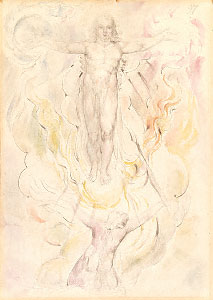Dante Adoring Christ
From Paradiso XIV:
CANTO XIV
From centre to the circle, and so back
From circle to the centre, water moves
In the round chalice, even as the blow
Impels it, inwardly, or from without.
Such was the image glanc'd into my mind,
As the great spirit of Aquinum ceas'd;
And Beatrice after him her words
Resum'd alternate: "Need there is (tho' yet
He tells it to you not in words, nor e'en
In thought) that he should fathom to its depth
Another mystery. Tell him, if the light,
Wherewith your substance blooms, shall stay with you
Eternally, as now: and, if it doth,
How, when ye shall regain your visible forms,
The sight may without harm endure the change,
That also tell." As those, who in a ring
Tread the light measure, in their fitful mirth
Raise loud the voice, and spring with gladder bound;
Thus, at the hearing of that pious suit,
The saintly circles in their tourneying
And wond'rous note attested new delight.
Whoso laments, that we must doff this garb
Of frail mortality, thenceforth to live
Immortally above, he hath not seen
The sweet refreshing, of that heav'nly shower.
Him, who lives ever, and for ever reigns
In mystic union of the Three in One,
Unbounded, bounding all, each spirit thrice
Sang, with such melody, as but to hear
For highest merit were an ample meed.
And from the lesser orb the goodliest light,
With gentle voice and mild, such as perhaps
The angel's once to Mary, thus replied:
"Long as the joy of Paradise shall last,
Our love shall shine around that raiment, bright,
As fervent; fervent, as in vision blest;
And that as far in blessedness exceeding,
As it hath grave beyond its virtue great.
Our shape, regarmented with glorious weeds
Of saintly flesh, must, being thus entire,
Show yet more gracious. Therefore shall increase,
Whate'er of light, gratuitous, imparts
The Supreme Good; light, ministering aid,
The better disclose his glory: whence
The vision needs increasing, much increase
The fervour, which it kindles; and that too
The ray, that comes from it. But as the greed
Which gives out flame, yet it its whiteness shines
More lively than that, and so preserves
Its proper semblance; thus this circling sphere
Of splendour, shall to view less radiant seem,
Than shall our fleshly robe, which yonder earth
Now covers. Nor will such excess of light
O'erpower us, in corporeal organs made
Firm, and susceptible of all delight."
 |
| Dante Adoring Christ William Blake Illustrating Dante National Gallery of Victoria From Paradiso XIV: From wiki Paradiso Paradiso (pronounced [paraˈdiːzo]; Italian for "Paradise" or "Heaven") is the third and final part of Dante's Divine Comedy, following the inferno and the Purgatorio. It is an allegory telling of Dante's journey through Heaven, guided by Beatrice, who symbolises theology. In the poem, Paradise is depicted as a series of concentric spheres surrounding the Earth, consisting of the Moon, Mercury, Venus, theSun, Mars, Jupiter, Saturn, the Fixed Stars, the Primum Mobile and finally, the Empyrean. It was written in the early 14th century. Allegorically, the poem represents the soul's ascent to God.
The Paradiso begins at the top of Mount Purgatory, at noon on the Wednesday after Easter. After ascending through the sphere of fire believed to exist in the earth's upper atmosphere (Canto I), Beatrice guides Dante through the nine celestial spheres of Heaven, to the Empyrean, which is the abode of God. The nine spheres are concentric, as in the standard medieval geocentric model of cosmology,[1] which was derived from Ptolemy.
The Empyrean is non-material. As with his Purgatory, the structure of
Dante's Heaven is therefore of the form 9+1=10, with one of the ten
regions different in nature from the other nine.
During the course of his journey, Dante meets and converses with several
blessed souls. He is careful to say that these all actually live in
bliss with God in the Empyrean:
However, for Dante's benefit (and the benefit of his readers), he is "as a sign"[3] shown various souls in planetary and stellar spheres that have some appropriate connotation.
While the structures of the Inferno and Purgatorio were based around different classifications of sin, the structure of the Paradiso is based on the four cardinal virtues (Prudence, Justice,Temperance, and Fortitude) and the three theological virtues (Faith, Hope, and Charity).
|
The fervour, which it kindles; and that too
The ray, that comes from it. But as the greed
Which gives out flame, yet it its whiteness shines
More lively than that, and so preserves
Its proper semblance; thus this circling sphere
Of splendour, shall to view less radiant seem,
Than shall our fleshly robe, which yonder earth
Now covers. Nor will such excess of light
O'erpower us, in corporeal organs made
Firm, and susceptible of all delight."
No comments:
Post a Comment